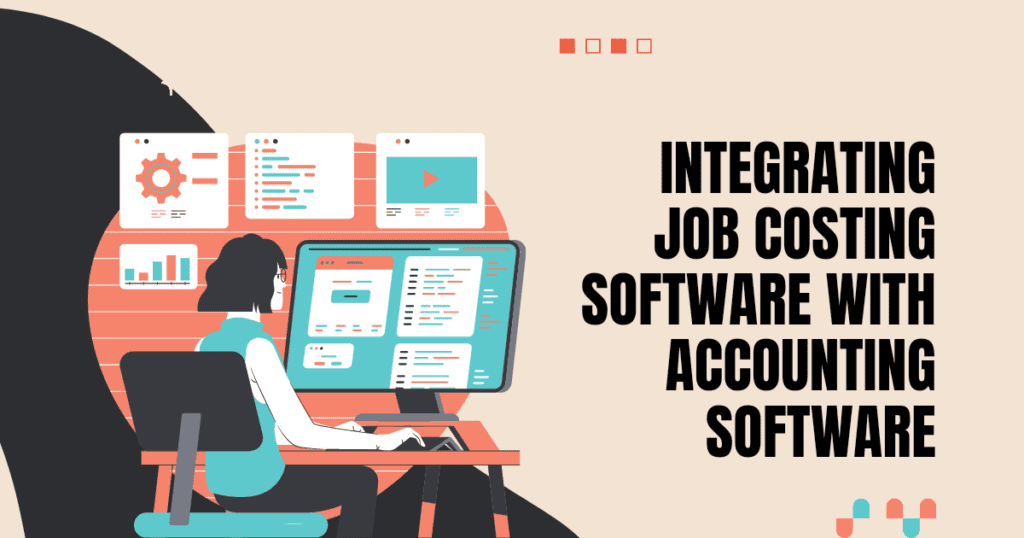Job costing software is a tool used by businesses to track and calculate the costs associated with a particular project or job. It helps businesses to determine the profitability of a project, manage resources effectively, and make informed decisions about future projects.
Accounting software, on the other hand, is a tool used by businesses to manage their financial transactions, including accounts payable, accounts receivable, and general ledger accounting. It helps businesses to keep track of their financial records and ensure accuracy in their financial reporting.

Integrating job costing software with accounting software is essential for businesses that want to improve their financial management processes. By combining the two tools, businesses can get a more comprehensive view of their financial data, make more accurate financial projections, and streamline their workflow.
This integration can lead to increased profitability, better resource allocation, and enhanced decision-making, making it an essential tool for any business that wants to succeed in today’s competitive market.
Key Takeaways
- Job costing software tracks and calculates costs associated with a specific project or job, while accounting software manages financial transactions, including accounts payable, accounts receivable, and general ledger accounting.
- Integrating job costing software with accounting software is essential for businesses to get a more comprehensive view of their financial data, make more accurate financial projections, and streamline their workflow, leading to increased profitability, better resource allocation, and enhanced decision-making.
- The benefits of integrating job costing software with accounting software include accurate job costing, real-time financial data, improved financial reporting, enhanced project management, streamlined workflow, increased profit margins, better resource allocation, and improved cost control.
Use the software to manage the whole Job costing process
Benefit 1: Accurate Job Costing
Accurate job costing refers to the process of accurately calculating the total costs associated with a specific project or job, including direct costs such as labor and materials, as well as indirect costs such as overhead expenses.
Integrating job costing software with accounting software ensures accurate and real-time tracking of all project-related financial transactions, eliminating errors and redundancies.
Accurate job costing provides businesses with a clear understanding of project costs, enabling informed decisions about pricing, resource allocation, and profitability. It also identifies inefficiencies, leading to process improvements that reduce costs and improve profitability.
Benefit 2: Real-Time Financial Data
Real-time financial data is immediately available for analysis and decision-making, including revenue, expenses, cash flow, and other key financial metrics.
Integrating job costing software with accounting software provides real-time financial data by automatically tracking and recording financial transactions as they occur, providing accurate and up-to-date financial information at any time, and reducing the risk of errors.
Real-time financial data benefits businesses by providing them with current financial information that enables informed decision-making, accurate financial projections, and effective cash flow management. It also helps businesses to respond quickly to changes in the market and identify trends, leading to better planning for future growth.
Benefit 3: Improved Financial Reporting
Improved financial reporting refers to the process of generating accurate and timely financial reports that provide a clear view of a business’s financial performance. These reports can include balance sheets, income statements, cash flow statements, and other financial metrics.
Integrating job costing software with accounting software improves financial reporting by providing a centralized platform for managing financial data, ensuring accurate recording and tracking of transactions, and generating comprehensive financial reports tailored to specific projects or jobs.
Improved financial reporting helps businesses understand their financial performance, make informed decisions, identify inefficiencies, and comply with accounting standards.
Benefit 4: Enhanced Project Management
Enhanced project management refers to the process of effectively planning, organizing, and executing projects to achieve desired outcomes. This can include managing resources, tracking progress, and communicating with stakeholders.
Integrated job costing software and accounting software enhance project management by providing a comprehensive platform for real-time tracking of project costs and progress, enabling informed decisions about pricing and resource allocation.
Enhanced project management benefits businesses by ensuring projects are completed on time and within budget, identifying opportunities for efficiency and cost reduction, and managing risk effectively.
Benefit 5: Streamlined Workflow
Streamlined workflow refers to the process of optimizing business processes to minimize waste and improve efficiency. This can include automating tasks, eliminating redundancies, and simplifying complex processes.
Integrating job costing software with accounting software streamlines workflow by automating the process of tracking and recording financial transactions related to specific projects or jobs. This integration eliminates the need for manual data entry, reducing the risk of errors and enabling businesses to focus on more strategic tasks.
Streamlined workflow benefits businesses by improving efficiency, accuracy, and employee satisfaction. This leads to reduced costs, improved profitability, and better decision-making based on accurate data.

Benefit 6: Increased Profit Margins
Increased profit margins refer to the amount of profit a business makes on each sale or transaction. This is calculated by subtracting the cost of goods sold (COGS) from the revenue generated from sales.
Integrating job costing software with accounting software increases profit margins by providing businesses with more accurate information on project costs, enabling them to price their products or services more effectively. Additionally, this integration allows businesses to identify areas where they can reduce costs, such as through improved resource allocation or process improvements.
Increased profit margins benefit businesses by improving their profitability, competitiveness, and financial stability. It allows them to reinvest in their operations, offer better pricing or higher-quality products/services, and withstand economic uncertainties.
Benefit 7: Better Resource Allocation
Better resource allocation refers to the process of effectively assigning and managing resources, such as people, time, and money, to achieve desired outcomes. This can include optimizing staffing levels, prioritizing projects, and managing budgets.
Integrating job costing software with accounting software helps in better resource allocation by providing real-time information on project costs and profitability, which can be used to make informed decisions about prioritizing projects and allocating resources.
Better resource allocation improves efficiency, reduces costs, and enhances project outcomes, ultimately helping businesses to remain competitive. It enables businesses to complete projects quickly and with fewer resources while ensuring desired outcomes and meeting customer expectations.
Benefit 8: Improved Cost Control
Improved cost control refers to the process of effectively managing and reducing costs associated with business operations. This can include reducing wasteful spending, improving process efficiencies, and implementing cost-saving measures.
Integrating job costing software with accounting software improves cost control by providing real-time information on project costs and profitability, which helps businesses identify areas for cost reduction and track expenses accurately and efficiently.
Improved cost control benefits businesses by reducing expenses and improving profitability, which can lead to reinvestment and new growth opportunities. It also helps businesses remain competitive by offering competitive pricing or higher-quality products/services and provides financial stability during economic downturns or unforeseen events.
Benefit 9: Enhanced Decision-Making
Enhanced decision-making refers to the process of making more informed, data-driven decisions that are based on accurate and up-to-date information. This can include making decisions about resource allocation, project prioritization, and pricing strategies.
Job costing software and accounting software integration improves decision-making by providing businesses with real-time information on project costs, profitability, and other key metrics. This helps businesses to make informed decisions about resource allocation, project prioritization, and other critical business decisions.
Enhanced decision-making benefits businesses by enabling them to optimize resource allocation, improve project outcomes, and remain competitive in their respective markets.
Benefit 10: Increased Customer Satisfaction
Increased customer satisfaction refers to the level of satisfaction that customers experience when interacting with a business. This can include satisfaction with products or services, customer service, and other aspects of the customer experience.
Job costing software integration with accounting software increases customer satisfaction by enabling businesses to complete projects on time and within budget, leading to better quality of work and effective communication with customers about project progress.
Increased customer satisfaction benefits businesses by retaining existing customers, attracting new ones through positive reviews and recommendations, and building a positive reputation and brand image for a competitive edge.
The Bottom Line
Integrating job costing software with accounting software provides several benefits for businesses, including accurate job costing, real-time financial data, improved financial reporting, enhanced project management, streamlined workflow, increased profit margins, better resource allocation, improved cost control, enhanced decision-making, and increased customer satisfaction.
Therefore, businesses should consider integrating job costing software with accounting software to improve their operations, increase profitability, and deliver better customer experiences. By doing so, businesses can gain a competitive advantage in their markets and position themselves for long-term success.



Great post.